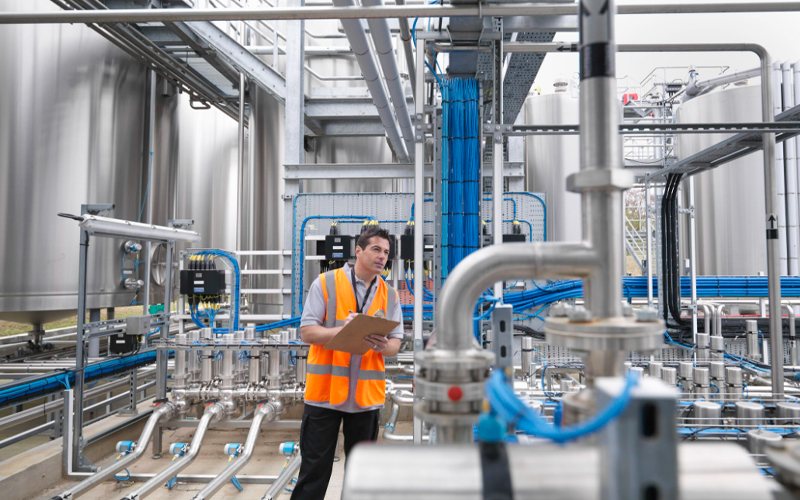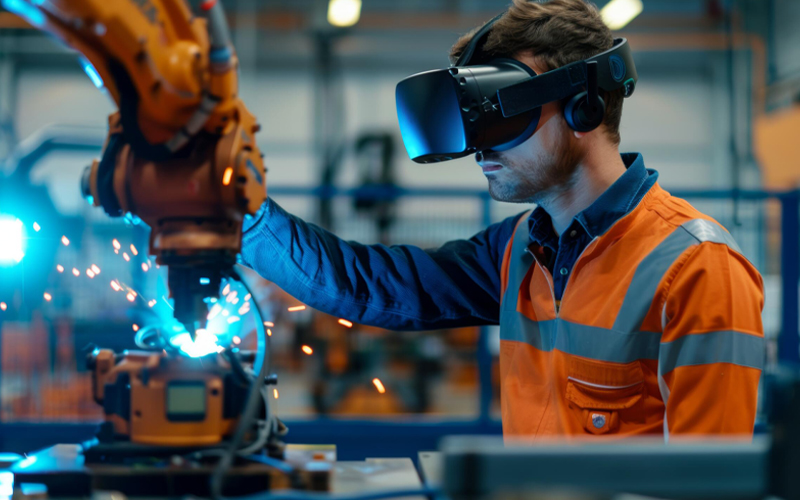According to a research survey by LRN, a company providing advisory and education on ethics, compliances, and corporate culture, businesses with better ethics and work culture outperform their peers by 40% on given metrics. These metrics include employee loyalty, growth in the bottom line, customer satisfaction, and more.
Stakeholder capitalism with environmental, social, and corporate governance (ESG) are key elements that convey a company’s commitment to values, purpose, society, people, and the planet.
What is ethical manufacturing?
Ethical manufacturing is a practice of following certain ideologies and translating them into measurable metrics to make a direct impact on –
-
Good health of all parties, including workers and consumers
Ensuring healthy working conditions and maintaining the work hours for better health and well-being of the workers. Making the work environment safe is also a part of legal compliance for the manufacturing sector.
Emphasis on workers’ safety and fair treatment directly impacts productivity, employee loyalty, and the business’s bottom line. However, the LRN report finds a big disconnect between the management and the workers. Workers are under pressure to overlook ethical issues and achieve short-term goals. Only 57% of production employees feel comfortable reporting unethical practices to authorities. -
Investing in the environment
An increasing number of consumers are aware of environmental concerns and look at the product's label before buying. Ethical manufacturing and sourcing are major buying decisions for 92% of millennials.
However, did you know that waste is a major concern in the fashion industry, creating over 92 million tonnes of textile waste annually? The textile industry must focus on reusability, reducing waste, and transforming processes.
-
Better socio-economic conditions
Fair treatment of workers through industry-standard wages is an important factor in ensuring loyalty. Responsible manufacturing units ensure great socio-economic conditions through measurable metrics. Some of the important factors are –
- Fair wages and gender-neutral work opportunities
- Corporate Social Responsibility (CSR)
- Medical insurance for floor and office workers
- Industry-standard quota of annual leaves
- Safe working conditions on the factory floor
- Systems to track and measure the metrics and set annual goals
-
Compliances and regulations
Due to potential health and safety hazards, manufacturing industries must comply with numerous regulations. These regulations could be specific to the country, a union of countries, or the industry type.
For example, the Occupational Health and Safety Administration (OSHA) enforces standards for workers’ health and safety through outreach, training, education, and assistance.
-
Usage of raw materials and energy for production
According to the US Energy Information Administration, manufacturing takes up 81% of energy consumption. The rest of the share goes to mining, construction, and agriculture. This is a huge pie that manufacturing units seek to reduce by adopting energy-efficient processes and machines. Another way is to adopt renewable energy sources such as biomass, solar, and wind.
A combination of renewable energy sources and metrics to measure the impact helps a business put numbers into action.
-
Process management
From inbound supply chains to production floor to market distribution, manufacturing units have numerous processes to handle and optimise. According to International Standards Organisation (ISO), the global logistics and transport sector emits a third of the global carbon dioxide (7.7 Gt in 2021).
Efficient processes with methods to monitor the difference caused in numbers help manufacturing units reduce operational expenses and carbon footprint.
The average ethical culture score of the manufacturing industry currently stands at 76%. Compared to this, the ethical culture score in the corporate sector is 81%.
Benefits of ethical manufacturing
Ethical manufacturing is not only good for the environment, workers, and customers but also for overall profitability. For example, paper production is a highly polluting and environment-damaging industry. By adopting the practices of regrowing and recycling, businesses not only save costs but also reduce their carbon footprint.
Ethical manufacturing is not an isolated but a circular process that improves processes to create end-user awareness through the right branding. Here are some statistics to prove how it makes a difference to the workforce –
- A satisfied and happy worker is 13% more efficient than an unhappy worker.
- 93% of the workers stay longer with a company that invests in their well-being.
Are you an ethical business?
Becoming an ethical business is a strategic approach that starts from identifying areas for improvement to setting newer processes to measuring them in numbers and charts. Ethics must apply to every layer of the business, and some of the starting points are –
- Identifying the areas for improvement
- Prioritisation of tasks that will make an immediate impact
- Making a short-term and long-term plan
- Allocating a budget for process and technological transformation
- Phased implementation
- Continuous training and development of the staff
- Monitoring the metrics
*For organisations on the digital transformation journey, agility is key in responding to a rapidly changing technology and business landscape. Now more than ever, it is crucial to deliver and exceed organisational expectations with a robust digital mindset backed by innovation. Enabling businesses to sense, learn, respond, and evolve like living organisms will be imperative for business excellence. A comprehensive yet modular suite of services is doing precisely that. Equipping organisations with intuitive decision-making automatically at scale, actionable insights based on real-time solutions, anytime/anywhere experience, and in-depth data visibility across functions leading to hyper-productivity, Live Enterprise is building connected organisations that are innovating collaboratively for the future.
How can Infosys BPM help?
Infosys BPM helps businesses comply with Industry 4.0, the digital transformation of processes with ethics as the goal. From new materials to technologies, production methods, skillset transformation, and planning processes, get a radical shift in your business outcomes.
Read more about manufacturing process outsourcing services at Infosys BPM.








